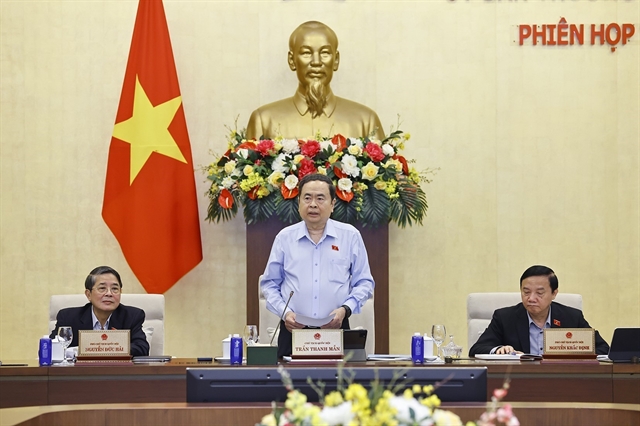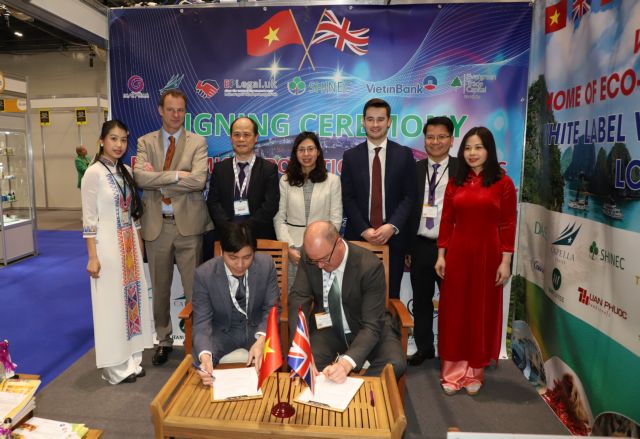 Economy
Economy

 |
| Nguyễn Cảnh Cường, Trade Counsellor at Việt Nam's Embassy to the UK. — VNS Photo |
The United Kingdom-Việt Nam Free Trade Agreement (UKVFTA), which officially took effect on May 1, 2021, has opened up many export opportunities for Vietnamese enterprises. To take full advantage of these opportunities and effectively tap into this lucrative market, however, is not an easy task for most local firms. Việt Nam News spoke to Nguyễn Cảnh Cường, trade counsellor at Việt Nam's Embassy to the UK, about the challenges faced by Vietnamese enterprises when exporting goods to the UK.
Can you tell us about the UK market?
Every year, British businesses import about US$7 trillion worth of goods from all over the world. The import demand of the UK market is quite stable and has tended to increase except during the COVID-19 pandemic.
Goods imported into the UK with a large turnover include automobiles, iron and steel, precious metals, oil, gas, medical equipment and supplies, electronic goods, textiles, footwear, furniture, food products, tea, coffee and vegetables.
Thus far, some Vietnamese enterprises have penetrated the UK market, but the market share is still modest. Prior to the pandemic, Việt Nam shipped $5 billion worth of goods to the UK annually, accounting for less than 1 per cent of the country’s total import turnover.
But I think there remain many untapped opportunities for Vietnamese businesses in the UK market especially now that the UKVFTA took effect in early 2021.
What challenges do Vietnamese enterprises face when they export goods to the UK?
The first challenge I want to mention is skyrocketing shipping costs (about $12,000 per 40-foot container) and irregular ship arrivals.
In addition, the high cost of participating in trade fairs in the UK poses a challenge for Vietnamese businesses even though those events help them introduce products, meet potential customers and grasp market trends in consumer tastes.
Administrative procedures also bring businesses headaches. For example, the process of applying for a rice variety certification in Việt Nam and that for a rice import licence in the UK are not timely and convenient. That sometimes makes some British businesses hesitate to buy Vietnamese rice because they are worried that Vietnamese exporters will not be able to send the necessary certificates before the ship arrives at the port.
Meanwhile, Vietnamese enterprises do not fully understand business practices in the UK. Their payment tools and payment practices have not kept pace with those of British enterprises.
The digital technology skills of many Vietnamese businesses have also failed to reach the level of British businesses and consumers, resulting in low e-marketing effectiveness.
Due to inadequate understanding of UK business law and insufficient risk prevention measures, Vietnamese firms are often at a disadvantage when they have a dispute with British customers.
 |
| A signing ceremony between Vietnamese and British businesses at White Label World Expo 2022 in London. — VNS Photo |
What suggestions do you have to help Vietnamese businesses overcome the above-mentioned obstacles?
I think the Ministry of Transport should draw up effective measures to reduce logistics costs while the Ministry of Industry and Trade (MoIT) should provide businesses with further support to attend big international fairs in Europe.
The MoIT should also team up with Foreign Trade University to organise short-term training courses for local businesses on effective methods of market access, business culture, business law and digital marketing in target export markets.
Additionally, Vietnamese banks should expand cooperation with British banks and businesses to offer Vietnamese businesses loan packages with more reasonable interest rates.
A Vietnamese business database in English should also be added by the Việt Nam Chamber of Commerce to its official website vcci.org.vn so that foreign enterprises can easily verify their Vietnamese partners and thereby do business with local enterprises.
For businesses themselves, they must meet quality requirements and production processes according to EU standards or British standards. The Trade Promotion Agency and industry associations can coordinate with the Việt Nam Trade Office in the UK and the British Standards Institute (BSI) to provide necessary standards for businesses.
Vietnamese enterprises can also improve their competitiveness by learning from their competitors through their websites or through major e-commerce platforms such as www.amazon.co.uk or www.alibaba.com or www.made-in-china.com.
In what industries can Việt Nam strengthen bilateral cooperation with the UK?
There are five major industries of the UK that Việt Nam can strengthen cooperation with.
The first industry is high-grade steel production using decarbonisation technology. This is a technology with lower power consumption and lower carbon emissions than traditional production.
The second one is the production of engines used for airplanes, ships, trains and cars.
Information and communication technology (ICT) is also one of them. Currently, the ICT sector in the UK is investing in high-speed transmission lines and is attracting talent from other countries. ICT is also considered as one of the important components of Industry 4.0 and can be considered as a foundational industry for many other economic sectors.
The last industry is wind power production and wind power equipment production. The UK is one of the pioneers in this field and is willing to help Việt Nam develop wind power to gradually replace coal power to achieve the goal of neutralising emissions by 2050.
What should Việt Nam do to co-operate with the UK in these five industries?
We can seek investors or manufacturers who wish to move factories abroad through big banks such as HSBC, Standard Chartered Bank, Lloyds and Natwest. These banks have sufficient financial and management capacity and the ability to find technology experts.
Meanwhile, we can also co-operate in R&D with British universities and research centres in the network of "High value manufacturing Catapult". It is a network of world-leading research, development and innovation centres with a mission to transform UK manufacturing to the needs of the market.
The Government can consider granting scholarships to students who study metallurgy, engine manufacturing, ICT, robotics, and renewable energy at British universities.
I believe that Việt Nam can coordinate with the British side, including attracting foreign investment and training human resources for the above-mentioned industries. — VNS




